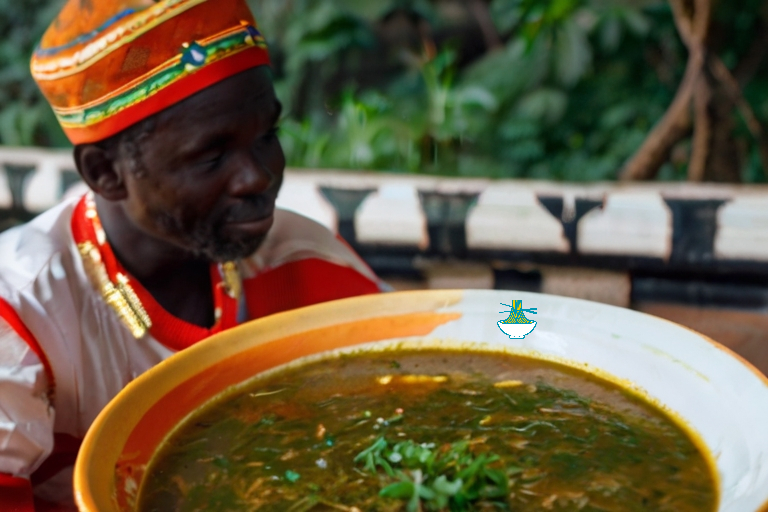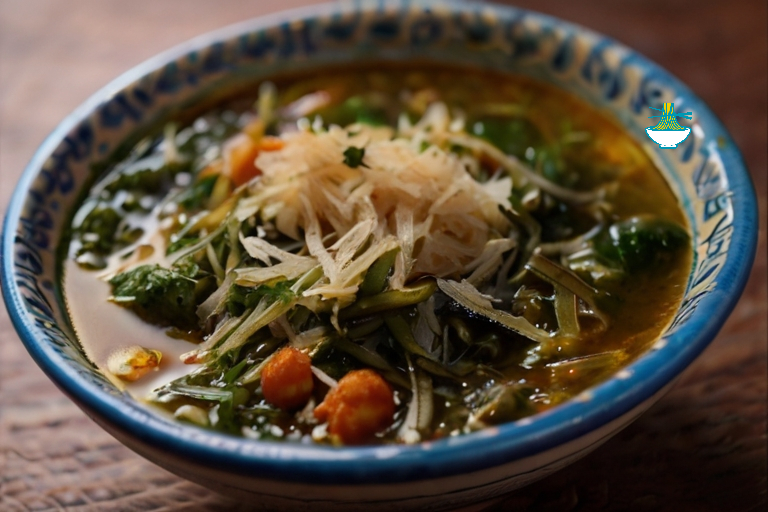Welcome to the heart of Cameroonian cuisine, where flavors dance in harmony to create dishes rich in cultural heritage and culinary delight. Among the diverse array of traditional recipes that grace the tables of Cameroon, Eru stands out as a quintessential dish deeply rooted in the country's culinary traditions. This beloved delicacy embodies the essence of Cameroon's rich agricultural landscape, blending indigenous ingredients with centuries-old cooking techniques passed down through generations.
Eru, often referred to as "Afang" in some regions, is a savory and nourishing dish that showcases the bounty of Cameroon's natural resources. Central to its preparation are two key ingredients: the hearty and nutritious leaves of the eru or okazi vine, and the tender shoots of the cocoyam plant. Combined with an array of spices, meats, and fish, Eru embodies the vibrant flavors and textures that define Cameroonian cuisine.
In this recipe, we embark on a culinary journey to uncover the secrets of preparing this beloved Cameroonian dish. From selecting the freshest ingredients to mastering the art of blending flavors, join us as we delve into the intricacies of crafting an authentic Cameroon Eru that will tantalize the taste buds and evoke memories of home for those familiar with its comforting embrace, while offering newcomers a warm introduction to the culinary wonders of Cameroon.
Ingredients:
- 500g eru leaves (okazi leaves), finely shredded
- 200g cocoyam or cassava, peeled and pounded (for thickening)
- 200g smoked fish (such as mackerel or catfish), deboned and flaked
- 200g beef or goat meat, diced
- 1 onion, finely chopped
- 2 tomatoes, diced
- 2 tablespoons red palm oil
- 2 cups water or vegetable broth
- Salt and pepper to taste
- Optional: crayfish or shrimp for added flavor

Instructions:
Prepare the Eru Leaves:
1- Wash the eru leaves thoroughly to remove any dirt or debris.
2- Finely shred the leaves using a sharp knife or kitchen scissors, discarding any tough stems.
Cook the Meat and Fish:
1- In a large pot, heat the red palm oil over medium heat.
2- Add the diced meat to the pot and cook until browned on all sides.
3- Stir in the chopped onions and cook until translucent.
4- Add the diced tomatoes and cook until softened.
5- Stir in the smoked fish, allowing it to infuse its flavor into the mixture.
Add the Eru Leaves:
1- Once the meat and fish are cooked, add the shredded eru leaves to the pot.
2- Pour in the water or vegetable broth, ensuring that the leaves are submerged.
3- Season with salt and pepper to taste.
4- If using crayfish or shrimp, add them to the pot at this stage for added flavor.
Simmer:
1- Cover the pot and allow the Eru to simmer over low heat for about 30-40 minutes, or until the leaves are tender and cooked through.
2- Stir occasionally to prevent sticking and ensure even cooking.
Thicken the Soup:
1- While the Eru is simmering, prepare the pounded cocoyam or cassava.
2- Peel and pound the cocoyam or cassava until smooth and creamy, adding a little water if necessary to achieve the desired consistency.
Serve:
1- Once the Eru is cooked and the leaves are tender, stir in the pounded cocoyam or cassava to thicken the soup.
2- Adjust the seasoning if necessary, adding more salt and pepper to taste.
3- Serve the Cameroon Eru hot, accompanied by a side of pounded cocoyam or cassava.
Enjoy the delightful flavors of this traditional Cameroonian dish, rich in cultural heritage and culinary excellence.
Nutritional Values:
Here are approximate nutritional values for the listed ingredients per serving:
Eru Leaves (Okazi Leaves):
- Calories: 15
- Carbohydrates: 3g
- Protein: 1g
- Fat: 0g
- Fiber: 2g
benefits:
- Rich in dietary fiber, promoting digestive health.
- High in vitamins A and C, supporting immune function and skin health.
Cocoyam or Cassava (Pounded):
- Calories: 110
- Carbohydrates: 27g
- Protein: 1g
- Fat: 0g
- Fiber: 3g
benefits:
- Good source of carbohydrates, providing energy for the body.
- Contains resistant starch, which may promote gut health and improve blood sugar control.
Smoked Fish (Mackerel or Catfish):
- Calories: 170
- Carbohydrates: 0g
- Protein: 20g
- Fat: 10g
- Fiber: 0g
benefits:
- Excellent source of protein, essential for muscle growth and repair.
- Rich in omega-3 fatty acids, which support heart health and reduce inflammation.
Beef or Goat Meat:
- Calories: 250
- Carbohydrates: 0g
- Protein: 25g
- Fat: 16g
- Fiber: 0g
benefits:
- High-quality protein source, aiding in muscle development and maintenance.
- Contains iron and vitamin B12, important for red blood cell production and energy metabolism.
Onion:
- Calories: 10
- Carbohydrates: 2g
- Protein: 0g
- Fat: 0g
- Fiber: 0g
benefits:
- Contains antioxidants like quercetin, which may reduce inflammation and promote heart health.
- Rich in prebiotic fibers, supporting gut health and digestion.
Tomatoes:
- Calories: 20
- Carbohydrates: 5g
- Protein: 1g
- Fat: 0g
- Fiber: 1g
benefits:
- Good source of vitamin C and other antioxidants, supporting immune function and reducing oxidative stress.
- Contains lycopene, which may reduce the risk of certain cancers and promote heart health.
Red Palm Oil:
- Calories: 240
- Carbohydrates: 0g
- Protein: 0g
- Fat: 28g
- Fiber: 0g
benefits:
- Rich in vitamin E and antioxidants, protecting cells from damage caused by free radicals.
- Contains healthy fats, including monounsaturated and saturated fats, which support brain health and hormone production.
Water or Vegetable Broth:
- Calories: 0
- Carbohydrates: 0g
- Protein: 0g
- Fat: 0g
- Fiber: 0g
benefits:
- Essential for hydration and overall bodily functions.
- Helps maintain fluid balance and supports nutrient transport within the body.
Salt and Pepper:
- Calories: 0
- Carbohydrates: 0g
- Protein: 0g
- Fat: 0g
- Fiber: 0g
benefits:
- Enhance flavor and palatability of dishes.
- Provide trace minerals necessary for electrolyte balance and nerve function.
Optional: Crayfish or Shrimp (Not included in the nutritional values provided)
Please note that these values are approximate and can vary based on factors such as cooking methods and specific brands of ingredients used. Additionally, the nutritional values for water and seasonings like salt and pepper are negligible and not included in the calculations.


Comments